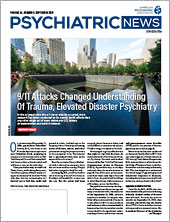There are no strong data that the use of psychotropic medications during or shortly after pregnancy causes adverse effects in mothers or their children, according to a comprehensive review published in Psychiatric Research & Clinical Practice.
This review was supported by the Agency for Healthcare Research and Quality and was conducted at the joint request of APA and the American College of Obstetricians and Gynecologists.
“After an exhaustive look at these medications, we did not confirm any harms like birth defects that worry pregnant women and their providers,” said lead author Meera Viswanathan, Ph.D., director of the RTI International-University of North Carolina Evidence-based Practice Center. “On the other hand, some harms can occur if mothers with mental illness are not provided needed treatment.”
The review included 164 studies published on or before June 5, 2020, that explored the benefits and harms of pharmacotherapy in pregnant or postpartum women who had depression, anxiety, bipolar disorder, or schizophrenia. Maternal benefits examined included symptom improvements, quality of life improvements, weight changes, and more. Harms examined included both maternal complications (for example, miscarriage, preterm labor/preterm birth, preeclampsia, and gestational diabetes) and adverse outcomes in the offspring (for example, congenital birth defects, low birth weight, respiratory distress, and/or delayed development).
Most of the studies looked at the potential risks of psychotropic medications, but despite the large pool of data, the panel found insufficient evidence to support a connection between perinatal medication use and subsequent harms. There was low evidence that selective serotonin reuptake inhibitors (SSRIs) and serotonin norepinephrine reuptake inhibitors (SNRIs) could increase the risk of postpartum hemorrhages, as well as low evidence linking SNRIs to preeclampsia risk. There was also low evidence suggesting that benzodiazepine use increases the risk of early pregnancy loss. Viswanathan noted that even in the cases with some supporting evidence, the studies could not fully rule out that the underlying mental illness as opposed to the medication was contributing to the harm.
“We rechecked the data related to the risk of congenital birth defects since we expected we would see some clear signal,” Viswanathan told Psychiatric News. (Several psychiatric medications including paroxetine, diazepam, and valproate have warning labels about birth defects.) “A careful review confirms that the risk of birth defects is unclear.”
There were far fewer studies looking at the benefits of prescribing psychotropics, but a larger percentage of these were controlled clinical trials. The review found that while there was moderate evidence that brexanalone improved symptoms of postpartum depression, there was low evidence that treating postpartum depression with the antidepressant sertraline could improve symptoms and increase the likelihood of remission. Additionally, there was low evidence that discontinuing mood stabilizers during pregnancy increases the risk of bipolar disorder relapse.
“It’s great that someone took the effort to conduct this thorough review of maternal mental health, and I think this paper will be useful for educating medical students and residents about the current landscape,” said Veerle Bergink, M.D., Ph.D., the director of the Women’s Mental Health Program at the Icahn School of Medicine at Mount Sinai.
Jennifer Payne, M.D., vice-chair for research in psychiatry and neurobehavioral sciences at the University of Virginia and an expert in women’s mood disorders, noted that the high amount of inconclusive data on the benefits of psychotropics does not imply they are ineffective in pregnant women. “We know they are just as likely to work during pregnancy as before or after,” she said. “What we don’t know is if we should manage these medications differently.”
While the review did not provide a clear answer to that question, Payne noted, it did at least offer a couple of directions for future research. “Take the potential risk of postpartum hemorrhage from using SSRIs; a reasonable question would be, what if we stop the medication shortly before delivery then restart after? Could that reduce the chance of hemorrhaging without any increased risk of depression relapse?” Funding and review board challenges make answering these and other such questions difficult, said Bergink.
A few years back while a professor in the Netherlands, Bergink led a pilot study showing that tapering women off antidepressants during early pregnancy and providing psychotherapy instead did not increase the risk of depression relapse compared with women who remained on medication. “Since coming to the U.S., I’ve been trying to do a follow-up study with a larger population, but I can’t get funding for it,” she said.
Payne, meanwhile, has launched a trial to see if regularly adjusting the lamotrigine dose in pregnant women to keep blood levels stable can prevent relapse while minimizing side effects. In her case, receiving funding for the trial was not difficult, but the trial was delayed for over a year due to various concerns from the Institutional Review Board that oversees the safety protocols.
“There’s still this stigma surrounding pregnant women and clinical trials,” Payne said. But she noted that many women understand the risks and benefits of taking medications while pregnant and want to participate in clinical research to help advance knowledge.
“Pregnancy and postpartum are extremely challenging,” Bergink said. “There are continual biological and hormonal changes, coupled with a loss of sleep, which is known to exacerbate the risk of mental illness. We need to support more perinatal mental health research so we can help women get through this critical period.” ■
“Maternal, Fetal, and Child Outcomes of Mental Health Treatments in Women: A Meta‐Analysis of Pharmacotherapy” is posted
here.

